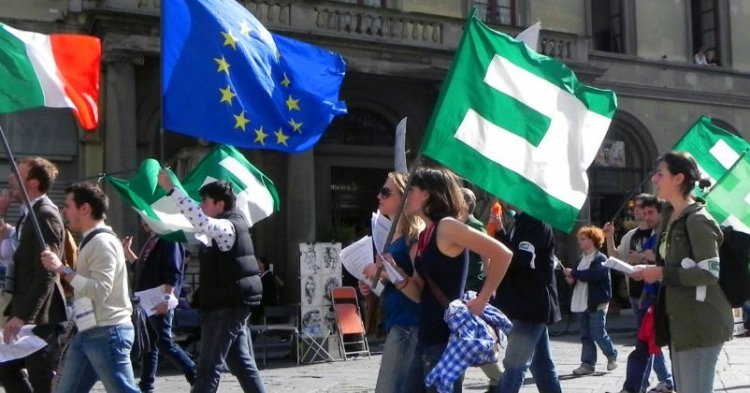Ever since its foundation, the European Union has incurred a commitment to promote peace, democracy, freedom and human rights in a spirit of pluralism, tolerance and solidarity.
Representative democracy is essential in achieving those values, as it provides citizens with the opportunity to communicate their preferences and concerns to politicians and government officials, and allows them to hold representatives accountable to their promises. It is therefore vital to democracy that all parts of society are actively involved in participatory processes.
However, recent trends show that this has not been the case. There has been a sharp drop in turnout rates among the youngest generation: in the 2014 European Parliament (EP) elections, only 29 per cent of those aged between 18 and 24 had participated as compared to a historically low 43 per cent average turnout – a worrisome trend recently reflected in national elections as well. This development comes despite several election campaigns that specifically addressed the young generation such as ‘MovEurope Forward!’ by the Young European Federalists, ‘Love.Youth.Future’ by the European Youth Forum, ‘iChange Europe’ by foundations Schwarzkopf and Mercator or the student initiative ‘I vote Europe’. As reasons for their absenteeism, an alarming number of young people state that they were either generally not interested in politics as such or largely dissatisfied with politics overall.
Reaching out to the young generation
Why can we not reach the youngest generation to go to the polls anymore? And what could we do to encourage them to get interested in politics at all? We believe that three specific reforms are vital in order to raise young peo-ple’s participation in European political life: reforming political education, enhancing electoral processes, and developing innovative tools for non-electoral and non-formal decision-making processes.
Reforming political education
Both formal and non-formal education are key pillars for a culture of political participation for all citizens, regardless of their socio-economic background or age. We argue that reforming political education is a major cornerstone to turn young people into responsible and politically engaged citizens. First, we support the idea of a ‘Pan-European Civic Education Course’ in curricula at all levels of education throughout Europe in order to increase awareness of Europe’s common roots and cultural backgrounds. Second, we think it is crucial that the European Parliament, the European Commission and Member States should improve the use of new digital technologies in order to inform citizens about opportunities for political participation. And third, we strongly support simulation events such as ‘School Parliament’, ‘Europe at School’ and ‘Model European Union’, which promote a closer cooperation between policy-makers and educational facilities on a local level.
Enhancing electoral processes
Electoral processes lie at the heart of democracy. Yet the EP elections showed that they are distant from young people’s daily lives. Therefore, we want to restart the discussion on transnational lists in European Parliament elections, because we firmly believe that the development of European political life will stimulate interest and participation in European politics. Second, open primaries for the election of European political parties’ lead candidates should be institutionalised before the next European elections. And third, we support the introduction of a quota for youth on electoral lists. Last but least, we defend the lowering of the voting age to 16.
Developing innovative tools for non-electoral and non-formal decision-making
Traditional participation, in the sense of voting in elections, is eventually limited in its capacity to trigger young people’s engagement and interest in politics. The youngest generation is characterised by ‘a new engagement’, leading to a need to develop innovative tools that go beyond traditional participation modes. First, we would like to invite members of the European Parliament as well as national parliaments to experiment with the inclusion of further tools of direct democracy in their representative systems, such as online debates and online voting, in order to involve citizens more directly in decision-making processes and to strengthen politicians’ representative mandate. Second, we specifically urge the European Commission to revise the technical procedure for the ECI, remove bureaucratic hurdles and actively provide information on legal issues to help associations handing in an ECI. And third, we remind national and European decision-makers that they must continue to employ a youth work strategy on the European level to empower youth.
In order to win back faith in the European project, Europe’s democracy must show that it is full of ideas and experiments for improvement, that it is bursting with the hope of building a Union that does better. This Union is still very much under construction, and everybody’s vote is needed to complete it. The youngest generation in particular should shape the Union in which their future will unfold. This is why their participation must increase. The democratic legitimacy of the European project depends on it. For too long now has Generation Y been branded as civically and politically disengaged.
It will be the responsibility of our very own generation to reverse the on-going trend of youth absenteeism.

1. On 11 January 2016 at 19:28, by KAPPIA Replying to: Political Participation: why and how we should address the young generation
Replying to: Political Participation: why and how we should address the young generation
can you send instructions on how to receive training, on election procedures and other civic related skills
Follow the comments: |
|
